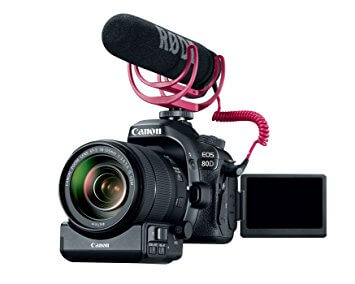How to Balance Life and Your Screenwriting Passion
Confession time: I work a full-time day job, and it’s not screenwriting full-time (yet). Whatever writing I do, it’s on a side or personal project, and whatever pay I get is either not enough to pay the bills or not coming until the project gets funding.
Over the years, I found that this is very much the norm for many an aspiring writer. But the biggest issue isn’t admitting that you have bills that writing can’t pay, but rather finding time to write.
And while I don’t have the schematics for a time isolation closet or something (and oh, how I wish I did), I can certainly give you a few pointers on what to do and what not to!
DO…Write Everyday (Even If It’s A Little Bit)
Oh reader, I know what it’s like to come home with a brain full of fried, worn nerves. (Well, that and a great dane mix who still thinks she’s a lapdog; especially when I’m trying to type.) But even then, it’s absolutely crucial to write every day!
Why, you might ask? Progress, dearest reader. It’s understandable that you might only get a few pages in at most, but it’s still a few pages closer to a finished project than you were yesterday. What’s more, those pages really add up after a while.
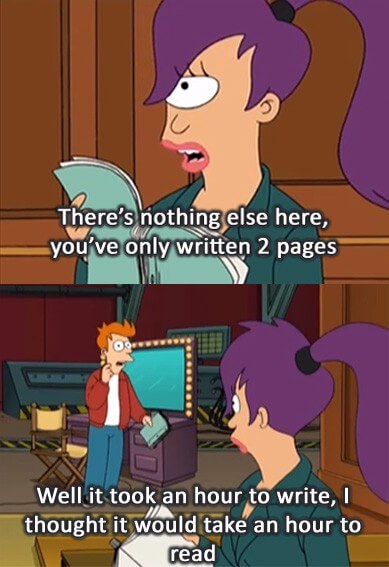
STILL, IT’S MORE THAN IT WAS AN HOUR AGO.
I try to write three pages of a script or story bible a day. It might not seem like much, but thirty days later, I’m looking at a ninety pages. This means that in a month, I’ll have a short feature script or full-fledged story bible.
Basically, write something, even if it’s just a half-idea you’re musing with. I’ve lost count of how many times I’ve returned to a half-baked premise later down the road and made something pretty decent with it.
DON’T…Overwork Yourself
I have some horrible news, reader. Despite what your eight-year-old self thought, you’re not an X-Men. You’re mortal. You have limits.
Hard work is a beautiful thing and is necessary for any sort of artist, but you need to take care of yourself. This means actually getting some sleep, remembering to eat, drinking water that isn’t going into a coffee maker, and going outside (assuming that you don’t live in the middle of the arctic circle or something).

ONLY OKAY IF YOU ARE WRITING SOUND EFFECTS.
Obviously, health concerns can be very much a thing. In fact, many artists have suffered from them before. For example, Roman Dirge of Lenore fame actually tried to go three days without sleep and downing coffee/No Doze cocktails to have time to work on his stuff, ultimately having his heart give out and landing him in the hospital.
But even if you’re the “work fast, die young” type, consider this: almost nobody is at their writing peak when they’re at the point of duct taping their eyes open. Speaking from experience, you might think you’re writing Shakespeare during the night. But come the morning when you read it, you’ll probably be wondering just how the hell that crazy guy who waves his junk at traffic broke into your place and got on your computer.
TD;DR- Sleep = good. Your writing without it = bad.
Do… Focus On ONE Writing Project
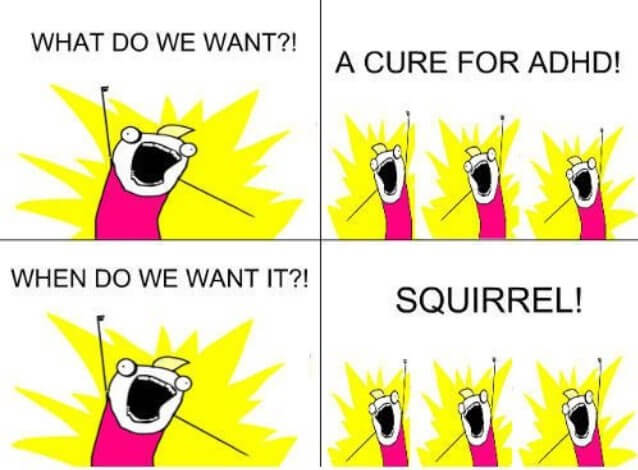
MEANWHILE, IN MY BRAIN.
I have idea ADD bad, in addition to sneezing out ideas left and right. As a result, it’s very hard to work on just one idea. As a further result, it can take a long time before a project gets done.
Thankfully (to my self-esteem, at least), I’m not the only one who has this problem. Also thankfully (to everyone this time), there are ways to fix this problem.
First, you need to decide which of your ideas to work with. What one gets you excited? Which one can you actually look forward to work on? What one is the most pitchable/useful to you career-wise? Which one has the most personal reason for you to complete it?
Once you figure that out, we get to the hardest part– actually writing the darn thing. This part varies from person to person. Some people make plans, some don’t, and some do and just say “Screw the plan” when they actually start writing. All the same, remove any distractions or temptations to work on any other project. Either way, key things to completing a project are discipline and focus.
But if you’re worried about putting an idea down, don’t worry. It will still be there waiting for you. Just keep your notes safe.
DON’T…Force Yourself To Write Something You Can’t Get Into
Big Magic by Elizabeth “Eat, Pray, Love” Gilbert is a must read for any artist; especially writers. Aside from the sort of wit and candid tone that makes us want to be friends with her in real life, she drops some serious, often painful truths that writers must face.
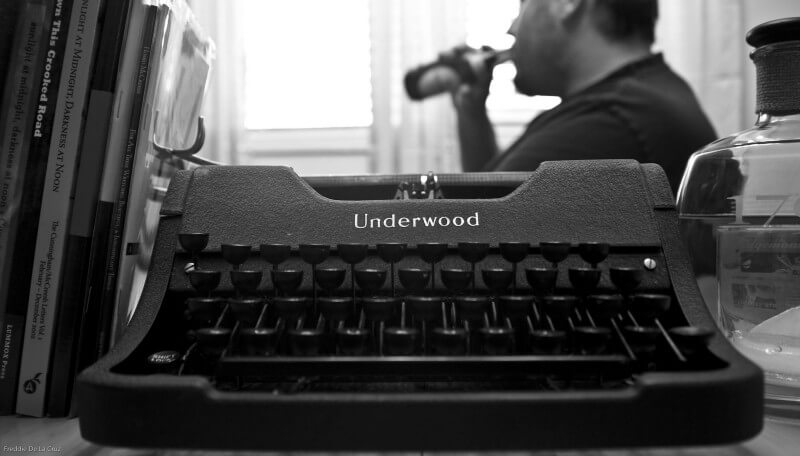
THOUGH, SHE MAKES NO MENTION OF THE “WRITERS ACTUALLY DRINK TO DROWN OUT THE PEOPLE WHO RECOMMEND ‘REAL’ JOBS TO THEM” TRUTH.
One such truth– some ideas have expiration dates. If you don’t feel passion for it, let it go. (I apologize for any “Let It Go” karaoke sessions I just inspired.) Any writing that doesn’t have heart in it is like a zombie without a soul. If it doesn’t excite you, stop writing it.
However, I’m ready to argue that not being into a project does not mean never working on it again, past experience set to vouch for me here. Don’t see it as forever throwing a project away; see it as setting it down until you’re ready for it. You’d be surprised about how much more justice can be done for a project with new eyes and more experience.
DO…Set A Time To Write
Structure is good for everyone, even for the most disorganized person. And though it also requires discipline and commitment, it’s worth it to set a certain time to write, just like with any other activity that needs to be done.
When you designate a certain time to write and keep it up over time, you’ll train yourself/your brain into sticking with this routine. This means writing everyday, which means completed projects, which means things for your portfolio, which means stuff to help you get ahead on your career.
But again, you’ll have to stick with this. This means turning down oh-so-tempting (if not outright seductive) offers of going out for Chinese and sushi with friends.
…Well, okay, if you’re me. Sushi is my kryptonite.
Oh! Unless you’re following the next “DON’T”–
…Completely Shun Humanity
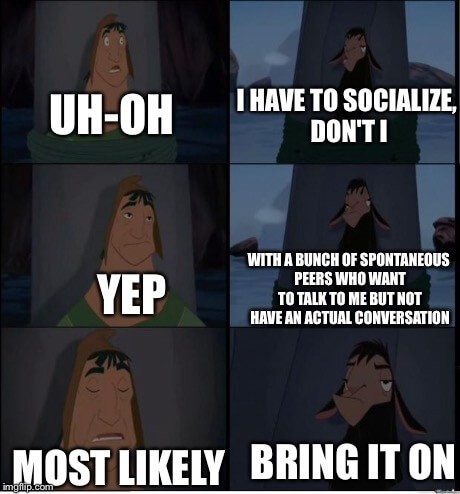
There was a time and a place when I thought I could be a hermit par excellence, as I was/am quite the anti-social person. One year of relying on remote gig/being stuck at my house for days at a time later, I’m having conversations with my dog.
You do need to dedicate time to write, but even then you need a break once in a while. After all, writing is still job, despite the passion you have behind it, so down team needs to very much be a thing. And like it or not, humans are social animals. I’m not saying go out and talk with people. I’m saying be around them. Go out grocery shopping. Eat out. Take a walk in the park.
In fact, this can even work to your advantage. If you could hang out with other writers, you would murder so many birds with one stone. Even if you don’t talk about your project or writing, they’re on the same frequency as you. They understand that writing is serious business to you.
Oh, and speaking of–
DO…Treat Writing Like A Second Job
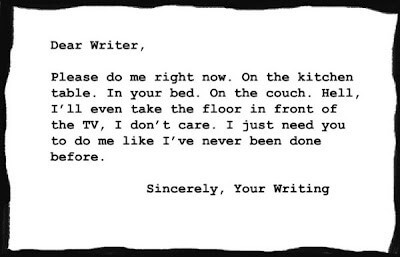
SO… WAIT, WOULD THIS TECHNICALLY BE SEXUAL HARASSMENT?
I know, dearest reader. You’re writing out of your sheer love for it and you’re not exactly using what funds you get to buy private islands. So how could you possibly consider it a second job?
Because writing (and the arts in general) is an exception to the rule. It’s a funny career path, in that you actually have to work towards getting it started. And as I stated before, you need to dedicate time to actually write.
When you treat writing like a second job, you get your brain to think “Oh! We need to take this very seriously and be committed to it.” It stops being just a hobby to you, and becomes something you will work hard at.
But…what about your first job?
DON’T…Be Ashamed Of Your Day Job

SINCE WHEN DID YOU EVER GET PAID FOR PUNCHING A CLOWN IN THE FACE?
You know the pain, don’t you reader? It’s either Thanksgiving or Christmas and that one relative who never sees you outside of these sparse get-togethers asks you what you’re doing for a living. Or maybe you bump into someone from high school and they ask about your progress on your youthful dreams of Hollywood.
The only thing that’s more painful than the question? Answering it.
Bad news, most beloved reader. Success isn’t overnight. Ask any writer or agent. A “quick” success often means years of waiting and hard work, which will also likely include working a day job.
But what does having a day job mean, reader? That you’re a foolish dreamer? A loser because you’re not (yet) at the point where you can pay your bills with heartfelt musings?
No, reader. It just means that you’re still working hard on your dreams, but you’re still responsible enough to actually be an adult.
Yes, you work a day job, but that does not mean you’re any less of a writer. You’re like the rest of us: working as hard as we dream.
Kera Hildebrandt is a writer, animator, and voice actress. She has a portfolio and a Twitter @Miss162.
2Bridges Productions Copyright © 2017. Address: 25 Monroe St, New York, NY 10002. Phone: 516-659-7074 – All Rights Reserved.
We are a participant in the Amazon Services LLC Associates Program, an affiliate advertising program designed to provide a means for us to earn fees by linking to Amazon.com and affiliated sites.


